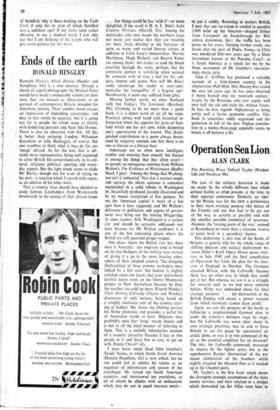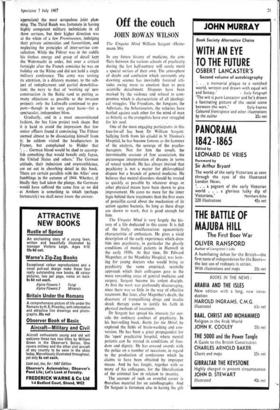Operation Sea Lion
ALAN CLARK
The task of the military historian is made no easier by the wholly different face whioh 'critical battles so often present, at the time, to their separate contestants. Dunkirk, an 'epic' to the British, was for the OKW a preliminary to their main strategic purpose (the defeat of the French) and one that had to be got out of the way as quickly as possible and with the smallest possible committal of resources. Alamein, the 'turning point of the war,' seemed. at Rastenburg no more than a tiresome reverse at corps level in a secondary theatre.
This dichotomy is also true of the Battle of ABritain—a generic title for the whole range of shifting decision and tactical deployment be- tween Hitler's Kroll Opera House peace over- ture in July 1940 and the final cancellation of Operation Sea Lion, the plan for the inva- sion of England, in October. The Germans attacked Britain with the Luftwaffe because there was no other way in which they could get at her. But whereas we saw it as a struggle for survival such as we had never endured before, Hitler was undecided about his final
strategic purpose: . . the destruction of the British Empire will create a power vacuum from which Germany cannot draw profit.'
Again, we saw the progress of the battle as following a predetermined German plan to erode the country's defences stage by stage; but the Luftwaffe was never clear about its own strategic priorities; was its aim to force Britain to sue for peace by operational air attack alone, or was it to win command of the air as the essential condition for an invasion? The cum, the Luftwaffe command, measured its success by the fighter score, but to the apprehensive Raeder 'destruction' of the RAF meant elimination of the bombers which nightly attacked the invasion fleet as it stacked up in the Channel ports.
Mr Taylor's is the first book which shows the divergent strategic assumptions of the three enemy services, and their relation to a project which demanded (as the Allies were later' to
appreciate) the most scrupulous joint plan- ning. The Third Reich was fortunate in having highly competent military technicians in all three services, but their higher direction was at the whim of a few Prominenten, indulging their private animosities and favouritism, and neglecting the principles of inter-service con- sultation. While the Fiihrer was in the saddle his tireless energy and grasp of detail kept the Wehrmacht in order, but over a critical fortnight after the French armistice he was on holiday on the Rhine and did not hold a single military conference. The army was turning its attention, in a dilatory manner, to the sub- ject of redeployment and partial demobilisa- tion; the navy to that of 'working up' new construction in the Baltic (and to putting as many objections as possible to the invasion project); only the Luftwaffe continued to pre- pare—though in no very great haste—for a spectacular, independent blow.
Gradually, and in a most uncoordinated fashion, the Sea Lion project took shape. But it is hard to avoid the impression that few senior officers found it convincing. The Fiihrer seemed almost to be dissociating himself from it; he seldom visited the headquarters in France, but complained to Halder that
. . German blood would be shed to accomp- lish something that would benefit only Japan, the United States and others.' The German attitude, their indecision and overconfidence, are set out in absorbing detail in this book. There are certain parallels with the Allies' own fumblings in the autumn of 1944. Whether, if finally they had taken the plunge, the Germans would have suffered the same fate as we did at Arnhem is something to which (perhaps fortunately) we shall never know the answer.







































 Previous page
Previous page